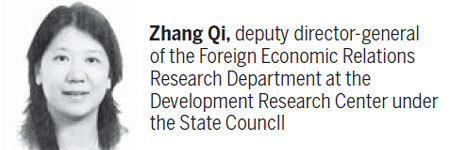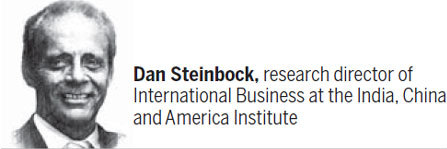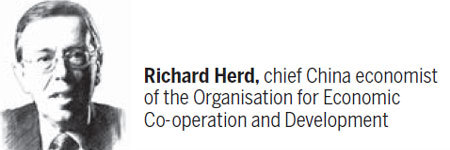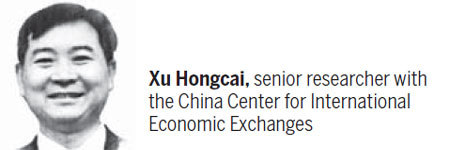 | |
|
Editor's Note: Ahead of the Group of 20 summit of the world's largest economies in Russia, the International Monetary Fund noted that developing countries have been hardest hit in the past few months by the US central bank's warning that it will soon taper its massive bond-buying program that poured cash into the economy to stimulate it. The subsequent slowdown in emerging markets, particularly Brazil, China and India, could hold back global economic growth, the IMF warned. What risks lie ahead and how can the BRICS nations coordinate efforts to deal with the potential impact? China Daily interviewed four economists for their views. | |
|
 | |
|
The long-term quantitative easing measures adopted by some developed economies after the financial crisis have led to a continuous increase in global liquidity. As a result, emerging countries have been burdened with spillover costs such as asset bubbles and imported inflation. Currency depreciation in several countries such as India has weakened their international competitive edge while other countries such as Brazil have failed to resolve their own problems by shedding the adverse impacts onto emerging countries. Since the United States Federal Reserve indicated in June that it may start tapering its quantitative easing measures, the international capital market has been saddled with increasing expectations of higher dollar returns. Patterns in global capital flows have been altered and large amounts of cross-border capital flows have been flooding back to the US. Emerging economies, including Brazil, India and South Africa, have suffered from currency depreciation, slumps in their stock markets and drops in market value since the capital withdrawal. The US has yet to decide a specific timetable for its QE exit, but a long wait will bring volatility in commodity prices. A long drawn-out capital withdrawal will bring more fluctuations to the capital market in emerging economies, which have already suffered from economic slowdowns. Emerging economies have been the major driving forces of post-crisis economic growth and any slowdown in growth for these nations will bring further uncertainties to a global economic recovery.
To deal with fluctuations in the international capital market, the BRICS countries need to strengthen cooperation effectively. First, measures to create a foreign currency reserve fund should be adopted to ease liquidity pressures and lower financial risks. Second, countries need to call for stricter supervision from international organizations such as the International Monetary Fund on monetary policies, such as QE measures. Third, emerging economies need to strengthen cooperation to buffer any adverse impacts blocking economic growth. 
The existing risks have shown the importance for countries to join hands in coordinating their macroeconomic policies. Since the launch of the G20 summit, its agenda has become broader and more fragmented, and sometimes countries have no clear, common goal. That has affected efforts by member countries to coordinate their macroeconomic policies. Emerging economies have attracted more attention with their growth, but they still have little say in global management reforms as compared to developed economies. One reason is that developed economies or host countries are the chief designers of summit agendas. Emerging economies have a limited say. It is important to create a mechanism that allows all member countries to participate in shaping the agendas, to make agendas more reasonable and representative, to further strengthen communications among countries and promote the effectiveness of the G20 mechanism. | |
|
Whether the next US Federal Reserve leader will be current vice-chairwoman Janet Yellen, former treasury secretary Larry Summers or somebody else, the simple reality is that moving too fast or too slow could severely disrupt the lingering recovery in the US. Consequently, the Fed will opt for gradual unwinding. Nonetheless, the economically more vulnerable BRICS nations are not immune to adverse impacts. In the short-term, the volatile “hot money” flows into BRICS have declined. India's growth potential has been downgraded. Brazil struggles to sustain its growth trajectory. In Russia, growth forecasts have been reduced. Similar challenges have been seen in Turkey, Mexico, Indonesia and other large emerging economies. As they say, “easy come, easy go”. When foreign investment is driven by opportunism, emerging economies must remain cautious. They need patient foreign investment rather than fickle hot money. Also, it seems that current markets are a bit too pessimistic about some BRICS nations and too optimistic about the G7 club, particularly Europe and Japan.
In the late 1990s, the rapid recovery after the Asian financial crisis was based on export-led growth. Today, there are fewer opportunities. It is important that BRICS can deter efforts at protectionism and sustain international trade and investment in a very challenging economic environment. It is also vital that the BRICS nations work together to accelerate institutional reforms in international multilateral and financial organizations. The International Monetary Fund, World Bank and World Trade Organization are still led by the postwar victorious nations 70 years after the end of World War II. As a result, the playing field is not even in international economy, finance, trade and investment. The BRICS nations should not wait for substantial change that is not likely to happen. Rather, they could move ahead on their own. Despite challenges, a BRICS development bank would be one way to at least focus attention, energy and financial support to issues that matter more to emerging and developing economies. 
For half a decade now, major advanced economies have engaged in different kinds of quantitative easing. That era will end in the fall as the US Fed will first gradually reduce its purchases of US debt and, by the mid-2010s, hopes to begin raising rates. Over time, Europe and Japan hope to follow in its footsteps. Until recently, the BRICS nations have largely responded to these shifts that have been shaped by the G7. The G7 and BRICS work together within G20, but the two live in different worlds. In the former, per capita income is $30,000 to $50,000 per year. In the emerging nations, it is closer to $5,000 to $15,000 annually. As a result, the BRICS nations have interests of their own within the global framework. As the era of quantitative easing is changing, it would be vital for BRICS leaders to develop a joint platform in order to shape the global agenda more proactively. | |
|
The likely tapering of asset purchases by the US Federal Reserve comes in response to a better outlook for the country's economy. Our near-term forecast suggests that the US will continue to grow at 2.5 percent this quarter and the next. In this context, the increase in long-term interest rates in the US represents good news, as it signals the US economy is beginning to come out of a great recession. It will be positive for BRICS, as rising US imports are likely to benefit the exports of those nations, though to varying extents. In the second quarter, the growth of GDP in BRICS picked up but remained weak by historical standards. However, the economies of the BRICS nations show considerable differences. India and Russia are experiencing sharp slowdowns in growth, while activity has been well maintained in Brazil and South Africa. In China, a recovery appears to be underway. The current weakness in exchange rates of the BRICS nations mainly reverses earlier movements. Immediately after the crisis, exchange rates appreciated as the Federal Reserve eased its policy. Once a policy change seemed likely, exchange rates fell. In most cases, the fall has more or less offset the previous rise. The principal exceptions are India and Russia, where exchange rates have sunk below their levels during the peak of the 2008 crisis. Growth has slowed markedly in these countries. These exchange rate gyrations have, of course, created some problems for these countries. Current account deficits have widened, but the movements have not been equal across the BRICS. The largest adverse changes were once again in India and Russia. The major risk facing most of the BRICS nations is that depreciation in exchange rates would spark a new round of inflation. Countries with credible monetary policies should be able to avoid major surges in inflation. Three of the BRICS nations generally aim for about 4.5 percent inflation. To help remain within their targets, two of these countries have raised interest rates.
Policies across the BRICS vary considerably. Information exchanges about economic policies are key to improving the resilience of BRICS during economic shocks. All of the BRICS nations are regularly invited to discuss economic policy at the Organisation for Economic Co-operation and Development committee meetings. There, they can collaborate with other emerging market countries. Not all of the BRICS nations attend regularly, but global problems require global solutions. China has already set up a number of arrangements with emerging countries to counter any short-term shortages of foreign currency for bilateral trade. Over the longer term, though, it is difficult to sustain fixed exchange rates without appropriate internal policies. 
Countries at the G20 summit face considerably different economic situations. It is natural for countries to respond to their internal economic situations. Indeed, many central banks are required by law to do so. The summit has coordinated action in the past, and we see the results of these decisions in the recovery that is now evident in developed countries. Whether or not the recovery becomes evident in BRICS, as it already has in China, will depend mostly on their internal policies. The exchanges at the G20 and the OECD are central to reaching a consensus on economic policies. Some of these common ideas, such as tax avoidance and bank regulation, have already been put into place by international organizations. A joint solution for controlling international capital flows, and exchange rates, would require a marked change in thinking among the advanced countries, and a number of emerging market countries. For the past 40 years, most of the leading economic powers have preferred to focus on floating exchange rates and open capital markets. | |
|
The tapering-off of the US Federal Reserve's quantitative easing policy has caused some turbulence in emerging economies such as India, Indonesia and Brazil. With the prospect of excessive easing of monetary policy ending and resulting in an increase in US power, international capital flew out of these countries and the local currency values tumbled. But it is worth noting that the turmoil was also caused by these nations' domestic deficiencies, such as excessively high deficits in current accounts and loose capital account management regimes. The Fed has good reasons to scale back its huge bond-buying program. The initiative was in response to the country's economic crisis and the policy had a role in the US and global economic recovery. Now, with growth recovering and the jobless rate subdued, it is reasonable for the US to cease its QE. Also, it did signal to the world before taking action. The US QE tapering has a limited impact on China. China has a good current account surplus and $3.5 trillion in foreign reserves. Its capital account remains controlled. Actually, as the US tightens its money supply, China could have more room to adjust its monetary policy independently.
The G20 summit provides a platform for the BRICS countries and other emerging economies to present their concern over the tapering off of the US quantitative easing policy. China should respond to these voices. China and other emerging economies should make the case that the US needs to be careful with the timing and rhythm of its exit. The BRICS nations should also build and strengthen the Contingent Reserve Arrangement, which now stands at $100 billion, with China as the largest contributor. This fund could be used for emergencies such as this round of local currency devaluation crises. 
The G20 is more representative than the G8. China should take more initiative in aligning other BRICS and developing economies to articulate their concerns at the summit. G7 countries usually hold meetings before the G20 summit to coordinate the voice they present at the G20. Why should BRICS nations not choose to do the same? Why not expand the BRICS group? Why not invite South Korea, an important world economy, to the group? |











